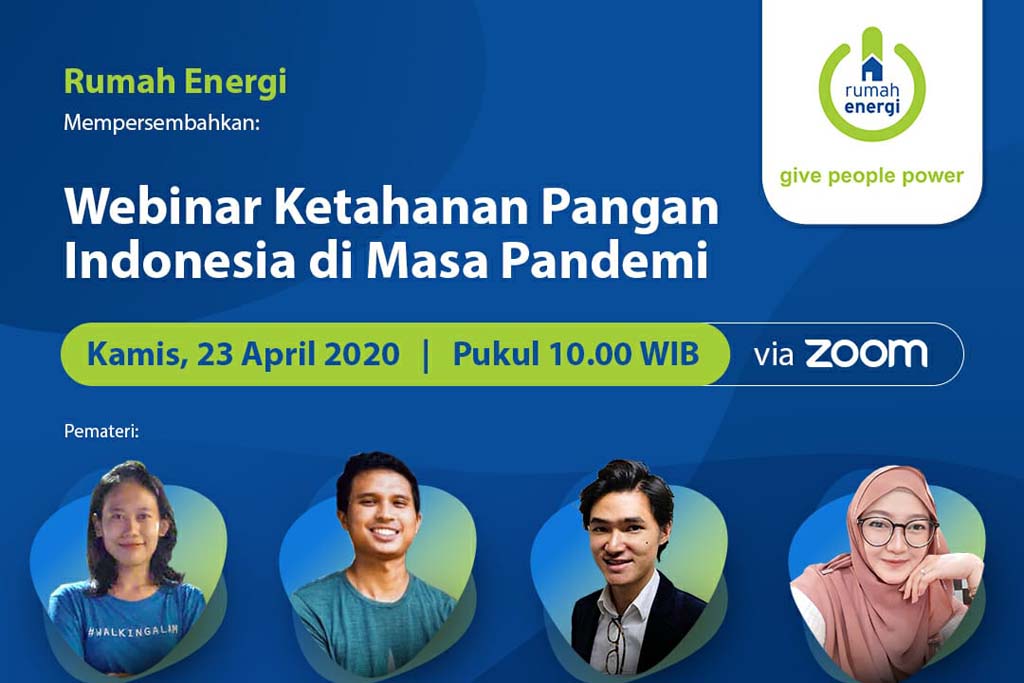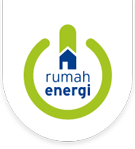Webinar: Indonesian Food Security during the Pandemic Period

Jakarta, 23 April 2020 – When all activities are hindered due to the period of Large-Scale Social Restrictions (PSBB) in most parts of Indonesia, there are several things that we, Indonesians can do, in maintaining stability or food security at least for the needs of our own families. Responding to the importance of this discussion, on April 23, 2020, Yayasan Rumah Energi (Rumah Energi) invited four young panellists who through their respective fields shared their experiences or knowledge that were useful to address this challenge:
- Reny Indarwati (Rumah Energi),
- Gibran Tragari (Sendalu Permaculture),
- Amadeus Driando Ahnan (Indonesia Tempe Movement, Better Nature Ltd), and
- Prima Luna (Research and Development Agency for Agriculture, Ministry of Agriculture)
In environmental conditions that are vulnerable to disease, we need to keep our immunity with nutrients according to the needs of the body. Based on Amadeus Driando’s exposure, the body needs macronutrients such as carbohydrates, proteins, fats, fibre, water, and energy; micronutrients such as vitamins and minerals; and phytonutrients (bioactive compounds obtained through plants). The nutritional content can be obtained by consuming various types of food, whether it is vegetables, fruit, or other livestock products. One of the local food products that are rich in nutrients is tempeh because it almost contains macro- and micro-nutrients that the body needs. Do not stop at the selection of nutritional sources, processing methods and storage of food products is very important in determining the quality of these products.
Fulfilment of people’s basic needs during the pandemic in the food sector has been well prepared by the government. Prima Luna, one of the researchers from the Ministry of Agriculture, said that in terms of quantity, food stocks are sufficient for the needs of the Indonesian people, but indeed several commodities need to be imported to meet the demand figures. Besides, the government also conducted several interventions aimed at strengthening the needs of farmers in maintaining the sustainability of agricultural activities.
Like the activities started by Sendalu Permaculture, a community-initiated by Gibran Tragari, that the simple steps we can take to maintain the fulfilment of family needs besides buying on the market are to start growing crops sustainably in the yard. Planting activities will be better if it starts with knowing the basic needs of the occupants of the house, for example, the type of vegetable or fruit that is most popular and fulfils the contents of carbohydrates, proteins, and other nutrients. Lack of land or lack of land for gardening can be dealt with by the hydroponic method that can be done without the use of land and in a small area. In addition to farming, attention to water reserves also needs to be increased since shortly it will enter the dry season so that it can provide water reserves or use water efficiently.
Activities at home are not protected from organic waste or food waste that cannot be consumed anymore. If treated properly, these wastes can provide good benefits, one of which is the use of biogas built by Rumah Energi. Biogas is a method to utilize gas produced during the process of decomposing organic waste into gas for cooking. This waste can consist of animal waste, especially cattle or goats, as well as kitchen waste, such as food scraps. The expected fermentation results are the many levels of CH4 gas which can indicate high heat so that it can be used as a gas fuel. In addition to processing waste and getting gas fuel, the by-product of biogas is liquid and solid fertilizer which can be used for agriculture or gardening activities at home.
All parties have a relationship with each other related to food security so it would be good if we start from the things that we can live the most well and especially for the needs of one family in advance related to this PSBB period.
If you miss this webinar, you can download all material from the panellists on the link. And, below is a recap of webinar activities.

